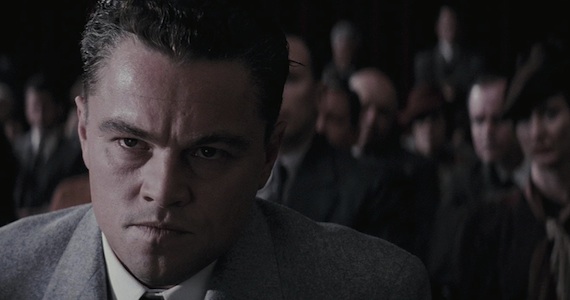Culture
The untouchable “J. Edgar”

J. Edgar
dir. Clint Eastwood
Release Date: Nov 11, 11
- 1
- 2
- 3
- 4
- 5
- 6
- 7
- 8
- 9
- 10
Rarely is a film’s screenplay so fully at odds with virtually everything else about it. J. Edgar is an appropriately obtuse biopic about John Edgar Hoover, the man who revolutionized criminal investigations while reportedly also turning the FBI (the Federal in FBI came in after Hoover took over) into his personal hit squad through which he could exercise petty vendettas. At least that’s the lesson that Dustin Lance Black and Clint Eastwood want to teach; the writer-director team (respectively) pull no punches in painting Hoover as an unsympathetic figure, a Machiavellian man-child with an unimaginably short fuse. And maybe that’s the problem.
The film uses Hoover’s late-era dictation of his memoirs as a framing device to tell the story of his rise to power in the first half of the 20th century, in large part due to his revolutionary uses of forensic science. Hoover was also shrewd in his understanding of the power information provides, as he reportedly kept secret files on virtually every major public figure, most of which disappeared after his death in 1972. For a man who used charm when necessary and overwhelming gravity whenever possible, it’s hard to imagine a better marriage of actor and character than Leonardo DiCaprio, who’s become more than formidable at conveying both. In an early scene with Helen Gandy (Naomi Watts), who would become Hoover’s lifelong assistant, DiCaprio takes a cutesy sequence in the Library of Congress and creates a sort of prologue for Hoover’s arc over the next two hours, all in the space of about three minutes.
DiCaprio alone is reason enough to see J. Edgar, as he exerts an unshakeable magnetism even when the film undercuts him. Disappearing fully into both the aged Hoover and his youthful beginnings, DiCaprio gives a performance that’s every bit as lacking in vanity as it is powerful. Out of a mixture of pressure from his loving but domineering and hateful mother (Judi Dench) and his compulsion to keep score in a game that after a while nobody but him is playing, Hoover begins high-strung and slowly descends into megalomania over the course of his life. Watching DiCaprio re-enact Hoover’s meetings with the Senate, in which his red-scare fanaticism takes on the pitch of a Southern Baptist preacher, is genuinely bone-chilling.
It’s a shame, really, that J. Edgar doesn’t always rise to meet the truly amazing performance at its center. Some of the fault lies with Eastwood, whose monochromatic color palette feels inappropriately sterile, but more is owed to Black’s screenplay, which expands heavily on one of the more popular rumors about Hoover’s life: his latent homosexuality. If you think that Black would write a film about the life of the FBI’s most controversial figure without including a cross-dressing sequence straight out of the “self-loathing gays on film” handbook, or that Hoover’s lack of interest in a series of attractive women would go unnoticed and without a series of digressive asides to drive the point home, you would be sorely mistaken.
For his part, DiCaprio does a remarkable job of holding the otherwise uneven film together, but it’s hard to stay engaged when the film lowers itself to cheap shots, such as when the inhumanly attractive Clyde Tolson (Armie Hammer, wasted here) comes into the picture. Hoover takes a shine to Tolson, and eventually moves him into the dual roles of right-hand man and clandestine emotional (not physical) lover, a role that Tolson dutifully plays to his very end. In order to communicate a clandestine love that could not be spoken, Hammer gets to preen and advise Edgar on his suits and interior decorating skills.
Though the film’s historical sections range from intriguing to dry, even the dullest is preferable to the histrionics DiCaprio is pushed into, or the moment when Black has Dench deliver a monologue about a shamed crossdresser from Hoover’s childhood school that revokes any sense of ambiguity the audience was allowed to find. J. Edgar is a fine film, and definitely one of Eastwood’s better after the recent missteps of Invictus and Hereafter, but there is frustration in the greatness a performance like DiCaprio’s deserves and does not receive.
[…] Media reviews new movies J. Edgar and […]
Totally disagree. Thought almost everything about Hoover’s rise to power and obsession with Communism was painfully boring. Whether the details are true or not, J. Edgar’s relationship with Clyde was the only thing that kept me going through the whole film, as well as the true center of his character.